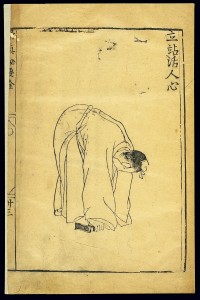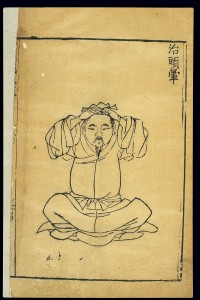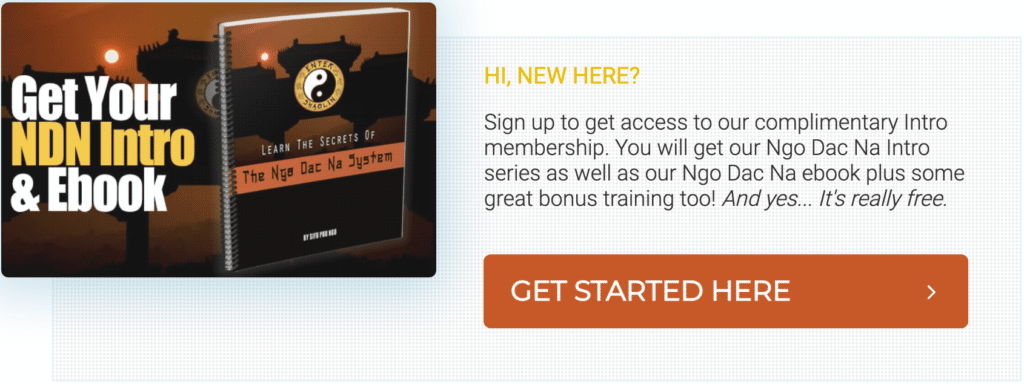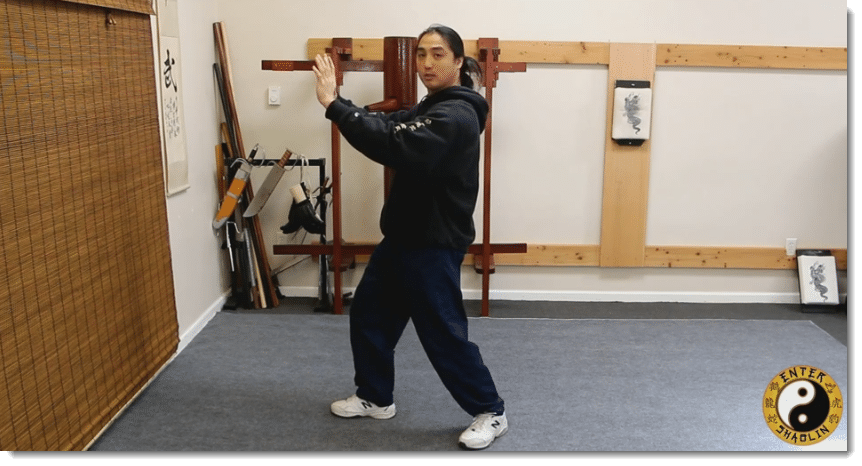What is Qigong?

Credit: Wellcome Library, London. Wellcome Images
[email protected]
http://wellcomeimages.org
Xiuzhen miyao, a gymnastic (daoyin/qigong) text of unknown origin, was rediscovered and published with a preface by Wang Zai in 1513 (8th year of the Zhengde reign period of the Ming dynasty). It records 49 exercises. This illustration depicts Lizhan huo ren xin (Standing practice to enliven one’s heart), a technique used to treat pain in the small of the back. It is practised as follows: From an upright standing position, one bends forward, lowering the head, until the hands are level with the toes. One circulates Qi for 14 breaths. This technique is also known as Wu long bai wei (Black Dragon swings its tail).
Woodcut
Library of Zhongguo zhongyi yanjiu yuan (China Academy of Traditional Chinese Medicine)
Shouyang congshu: Xiuzhen miyao (Longevity and Cultivation Series: Arcane Essentials of Cultivating Perfection)
UnknownTransmitted by Wang Zai (Ming period, 1368-1644)
Published: 1593
A literal translation of qigong into English results in something along the lines of “qi cultivation.” Qi lacks an exact analog in English but has similar counterparts in cultures situated all around the world, with examples ranging from the pneuma of ancient Greece to the prana of modern Hinduism.
In short, qi can be thought of as being a sort of life force that exists in all living things.
As a result, qigong is something of a catch-all term for the practices used to cultivate qi in the practitioner as well as bring it into balance at the same time.
In more practical terms, qigong encompasses a number of practices that range from massage and meditation to breathing exercises and flowing movements.
All come together to align both mind and body in accordance with ancient Chinese beliefs about the role of humans in the cosmos.
What is the History of Qigong?

Credit: Wellcome Library, London. Wellcome Images
[email protected]
http://wellcomeimages.org
Xiuzhen miyao, a gymnastic (daoyin/qigong) text of unknown origin, was rediscovered and published with a preface by Wang Zai in 1513 (8th year of the Zhengde reign period of the Ming dynasty). It records 49 exercises. This illustration depicts a technique for treating dizziness. It is practised as follows: One sits upright, clasping the head in both hands, and using one’s gong power, circulates Qi for 17 breaths.
Woodcut
Library of Zhongguo zhongyi yanjiu yuan (China Academy of Traditional Chinese Medicine)
Shouyang congshu: Xiuzhen miyao (Longevity and Cultivation Series: Arcane Essentials of Cultivating Perfection)
UnknownTransmitted by Wang Zai (Ming period, 1368-1644)
Published: 1593
Given the nature of qigong, it should come as no surprise to learn that it can be traced to some of the earliest practices in Chinese culture, stretching all the way back into prehistory.
However, qigong has continued to change over the course of its existence, drawing influence from foreign cultures as well as continuing to develop its own practices.
In this, it is much the same as Chinese culture as a whole.
The earliest practices that can be classified as qigong are thought to have developed out of healing dances that made use of both exclamations and movements to influence the performance of human bodies.
Later on, these breathing exercises and flowing movements became associated with the concept of qi, which was first recorded in the Book of Changes sometime between the 10th and the 4th centuries BCE.
By the time China had entered into the period of cultural flourishing called the Hundred Schools of Thought between the 6th Century and 221 BCE, said practices had become entrenched as an essential part of Chinese medicine.
However, it was not until sometime between 206 BCE and 220 CE under the Han Dynasty that qigong managed to add meditation to its repertoire, as both Buddhism and Buddhist practices were introduced from the Indian subcontinent.
For some, qigong became a means of reaching enlightenment by escaping the cycle of reincarnation, while for others, qigong continued to be a means for them to exercise control over both their minds and their bodies for the better.
In light of this, it was no coincidence that qigong became incorporated into both internal martial arts and external martial arts under the rule of succeeding dynasties, as shown by the examples of both Wudan Internal Elixir and Shaolin External Elixir.
In present times, qigong has become more and more popular with more and more people, not least because of official support in its homeland.
As a result of extensive effort, qigong can now be classified as belonging to one of five separated but nonetheless connected families based on either Daoism, Buddhism, Confucianism, Chinese medicine, or Chinese martial arts.
Each can boast of a rich heritage that serves to provide its practitioners with a wide range of benefits and uses tailored to its intended purpose.
What Are the Benefits of Qigong?
In modern times, the benefits of qigong are focused less on spiritual matters and more on practicalities. Although each of the five families provides its own benefits and uses, there are more than enough commonalities between them to result in similarities across classifications, with some of the most common examples being listed here:
- Considering the practices that makeup qigong, it should come as no surprise to learn that the practice of qigong provides the same benefits as regular exercise. In short, practitioners of qigong can expect to see improvements to their athletic performance, improvements to their internal systems such as the heart and lungs, as well as a reduced chance of serious injury as a result of looser and more relaxed joints and ligaments. Combined, these benefits ensure that practitioners of qigong can live happier and healthier lives.
- Modern living can be stressful, which is problematic because continuous stress suppresses the immune system with serious consequences for both mind and body. Fortunately, qigong can relax its practitioners, thus keeping their immune systems running at peak performance while also ensuring that their emotions remain in balance. As a result, qigong is as beneficial for mental health as it is for physical health. Both of which can be counted as essential components of human well-being.
- Serious illness can make it impossible for sufferers to exercise, thus making their bodies weaker and weaker at a time when their bodies need all the strength that they can muster. In contrast to most of the exercise routines that can be found out there, qigong is not strenuous while still being an efficient and effective means for people to hone their bodies. In fact, there are some techniques in qigong that are so undemanding that they can even be performed by people in their beds, thus providing them with a means to build themselves back up from the bottom.
- Likewise, this means that qigong can help people recover from serious traffic accident injuries in less time. This takes a number of forms, ranging from helping people to relax even in stressful situations to keeping their strength up through the provision of non-strenuous exercise.
Contact Us
To learn more about either qigong history, qigong benefits, or even qigong in general, please do not hesitate to contact us as soon as possible.
Better still, subscribe to us to get our 5-day video course free of charge as well as an e-book on the Ngo Dac Na system.
A combination that serves as an excellent introduction to qigong while also providing more than enough advanced material to make things interesting even for more advanced practitioners of qigong.


Hi there I am a born again Christian. And I am a little skeptical about qigong. I am a student of shaolin Martial arts and I’ve heard that qi is a demonic power. I am inclined to agree as all true power comes from Jesus Christ. But I wonder what you think
Sincerely Joseph
Hey Joseph, qi is not demonic power, the word qi means air. We get our power by learning how to breathe and control that air when we generate power. It is a natural event. Think of sneezing or coughing. You put your body under pressure by holding your breath and contracting your muscles thus creating pressure that allows for energy. People who don’t understand things are too quick to call it evil. Think of the Salem witch days, anything they didn’t understand they would call it witchcraft. I call it ignorance. If a person doesn’t know what it’s all about, then learn about it before you talk about it. I went through the same thing with people telling me how wrong it is but as I learned and understood what it really was, I felt stupid to just take people’s word on it. Hope this helps.
If its helpful and good for a person I would never classify it as evil. If you believe in a Devil running around causing mischief and stuff then, why would the it work against itself? Just saying.
that was an incredibly well written article. Thank you! Qi gong seemed like a mysterious practice when I first started, but the more I did it the more I realized that it has nothing to do with belief or perspective – its about feeling and awareness. Now qi gong is part of my daily life and I don’t even think of it as qi gong – just breathing, awareness, and feeling….it’s done wonders for me, my health, and my day to day peace of mind. It’s amazing how many points of frustration or anxiety just pass away with your breathe when you let them.
Hi Ray, thanks for the comment. It is amazing what Qigong can do for you isn’t it?
Personally I have had many different situations in my life where doing chi gong has helped me. It’s certainly a staple part of a good health and wellness routine.
Thanks again for stopping by and commenting.
Thanks! Love the “Roots” of Chinese civilization, and the evolution of humanistic “Energy”!
Greetings, Wing Chun Bro. and Sisters
I’m native american and have just joined your site this past month. enjoyed your youtube wing chun for the past 6yrs or so. Went to class for 6yrs and I went through all three forms and now beginning to piece it together. Like we say , Native way. Material, Spiritual and Supernatural and we have all our life to learn how to piece it all together. A life long process and I feel I just began taking baby steps, at the age of 60 yrs. old.
Understanding life flows and how we are truely connect to Mother, Earth. We are truely brothers and sisters to the tree: and all living things, example, what we breath out the tree breaths in and what the tree breaths out we breath in. Truely connected and rely on each other. anyway thanks for your understanding and sharing your gifts.
Your Native Brother
Welcome to the family Lawrence!
Welcome again brother and thank you for sharing your beautiful background with us! Sifu Larry and I both have some Native American in our DNA. It is indeed a lifelong process and it just gets better as the beauty unfolds! Indeed we are all one brother! I am honored to know you. Blessings!
I have a little Blackfoot in my background! “Under the sky there is but one family. It just so happens that people are different”. – Bruce Lee. And as the body of Christ we can utilize those differences for the good of all. What wondrous love indeed.
Hi Y’all, I’ve yet seriously to look into Qigong & Tachi but I’m seeing a lot of similarity in Wing-Chun principles. It seems the subtle arts are in the soft system. Are the founder of the origins all the same? Thanks, Tempa
Great summary on Qi-gong
Glad you enjoyed it! 🙂
Well written !
Glad you enjoyed it brother! I plan on adding more to it as time goes on as we were just able to cover the surface. There’s so much more to share!
Great information. Sifu.
Glad you enjoyed this article!
I am also a Christian. I remembered when I became a Mason and everyone said it was of the devil. They said we were so secretive and they did not understand it. I believe it is the same with Qigong. People are not educated on the art. I do agree whole heartedly with Sifu Phu Ngo. Before you can make negative comments about something. You need to try it out first. Do not believe what people say. Believe what people have experienced. I am really considering this art. It seems like a very good all around martial art.
Thank you for your time.
Rocky
You are most welcome Rocky! Everything is a tool, it can be used for bad or for good. We choose to use it for good. If you need any help, we are here for you! God bless!